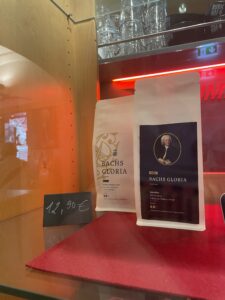Upon my arrival in Leipzig, I noticed the ‘great man’ everywhere – from the street names, like Karl Liebknecht Straße and Bernhard Göring Straße, to the statues of figures like Leibniz, Bach, and Mendelssohn that towered over me as I walked past. It seemed to me that Bach was being used as a marketing tool: a ‘great man’ who was being used to attract tourists (for an example, see the Bach fest banner at the Hauptbahnhof). Until fairly recently, biography writing similarly struck me as a ‘great man’ venture (as discussed by Marshall, p.12). Despite the fact that I have taken several literature, history, and music classes, where I have been taught that interpretation is quite possibly the furthest thing from what can be described as ‘static,’ I could not fully grasp the idea that biographies evolve. But reading Heller’s “Postlude and Prelude: Bach and the Baroque” and particularly Marshall’s “Young Man Bach: Toward a Twenty-First Century Bach Biography” changed my mind. Both articles brought to the surface considerations that have formerly been left out of Bach studies – Marshall encouraging a psychological interpretation of Bach’s troubled childhood (which perhaps went a little too far) and Heller emphasizing the way in which humour wove its way into Bach’s life and music. The latter was further illuminated by our visit to the Bach archive during which Peter Wollny told us a fascinating anecdote about the letter of recommendation penned by Bach’s daughter! I was particularly fascinated by Heller’s attention to the coffee cantata. I have since listened to several recordings that have shifted my interpretation of humor in music, much in the same way as I have recently come to notice moments of humor in texts I formerly perceived as serious. Biography, I have realized, is not static: in the same way as we continue to interpret and re-interpret music, our understanding of the lives of the ‘greats’ evolves and adapts in different contexts. Walking around Leipzig and considering the way in which Bach is marketed over the past week, I have had time to pay attention to Bach’s shifting legacy. He is no longer imagined as a stern, overpowering figure – at the Bach Archive shop, bags of coffee are being sold with the Bach brand (see below). The very theme of the Bach festival – ‘Transformation’ – gets to the heart of this observation, lending itself to a renewed and evolving understanding of Bach’s life and works. One concert that embodies this is the Queerpassion – I would have loved to have gone to see it, but it unfortunately would likely have overlapped with our concert tonight. It seems fair to say that Bach no longer lives in my imagination as the stern, serious figure who once captured my attention. I look forward to continuing my exploration of biography as I begin reading the book Quartet by Leah Broad, which tells the stories of four overlooked female composers from the nineteenth and twentieth centuries. It is exciting to think that formerly overlooked historical figures are beginning to receive the attention they really deserve – I look forward to learning more about the women including Bach’s wives and daughters, and Christiana Mariana von Ziegler who played important and yet underappreciated roles in his life!

Charlotte, Thanks so much for thinking through these challenging issues. Marketing is certainly a factor—the situation in Salzburg for Mozart is truly over the top (even though he hated Salzburg and was so happy to go to Vienna!). There’s been a huge change in the way that Bach scholars are approaching the music and the man. As I mentioned, years ago the woman subject was all but “verboten.” But lives are not static and biography writing is a particularly challenging task. My colleague Simon Morrison published a book on Tchaikovsky last year that turns around many of the narratives that had become popular in recent decades—but these narratives can be very persistent. When I wrote the baroque book, I was really ambivalent about how to handle (no pun intended) the Bach chapter — I didn’t want my whole book to be “the path to Bach”—but I knew he had to be there. I struggled with whether or not o have a whole chapter devoted to him, but in the end—after teaching baroque music a number of times — I realized students really wanted to immerse themselves in his music, as we have done here. Thanks for this!